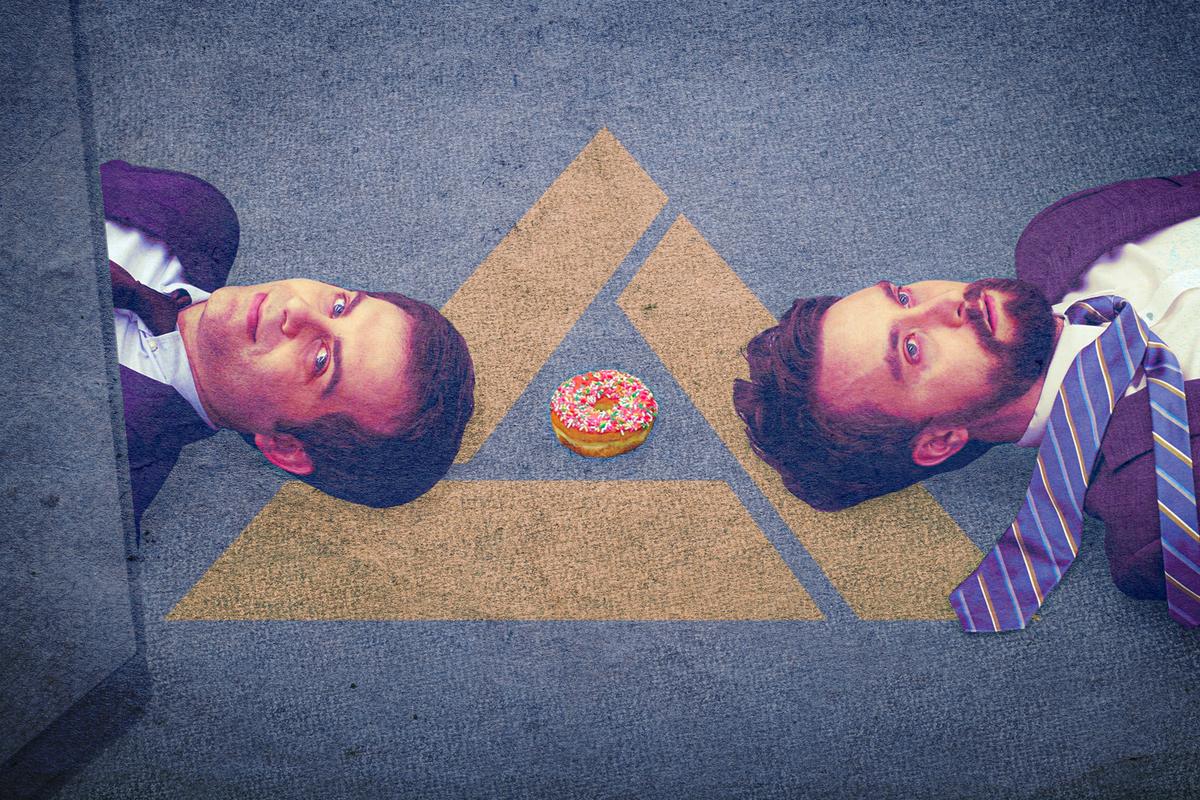
Pop culture does not lack for jaundiced views of the global plutocracy. Last year may have seen the trend’s zenith, with a Best Picture win for Parasite flanked by more populist thrillers like Knives Out and Ready or Not. On TV, Succession has earned widespread hosannas for its vivisection of the .01 percent, and now has 18 Emmy nominations to show for it; the principal antagonist of Mr. Robot was a sprawling conglomerate known as E Corp, possibly short for “Evil.” Even sitcoms like Silicon Valley take a skeptical eye toward the new ruling class, which has traded suits for casual wear, but is no less nefarious.
Bleak as these stories may be, the bleakest of all is Corporate, now in its third, final, and abridged season on Comedy Central. Succession is a view of our pyramid-shaped class system from its rarefied peak; shows like Superstore, about hourly wage workers at a Walmart-type outlet in St. Louis, center the proletariat at its base. Created by costars Matt Ingebretson and Jake Weisman with director Pat Bishop, Corporate takes place in the gray, mushy middle. It’s a place staffed by drones self-aware enough to know what they’re doing is useless at best and destructive at worst—but not enough to actually do much about it.
Corporate’s namesake behemoth is Hampton DeVille, a deliberately generic omnibus that “makes everything.” The setup makes a statement about the handful of megacorporations that control so much of our lives, like BoJack Horseman’s AOL–Time Warner–PepsiCo-Viacom-Halliburton-SkyNet-Toyota–Trader Joe’s. It also gives Corporate the flexibility to take on whatever part of our modern dystopia it wants: office politics and etiquette; the futility of maximizing leisure time or quitting one’s job; even the Streaming Wars and algorithmically generated kids’ shows, which collide in the season premiere. Hampton DeVille is ruled with an iron fist by cofounder Christian DeVille (The Wire alum Lance Reddick, who is using his gravitas to more absurdist ends). But our look into its inner workings starts much further down the org chart.
Ingebretson and Weisman play Matt and Jake, two functionaries in the nebulous gray area between work friends and actual friends. (The fluorescent-lit cubicles and break rooms where they spend their days are, of course, a more literal gray area.) Matt is the foolhardy optimist to Jake’s hardened nihilist, a dynamic that gets its fullest exploration in a midseason episode about Jake’s lifelong depression; Matt imagines himself as an SSRI-toting Mary Poppins, while Jake’s mental illness manifests as a misanthropic dog voiced by Bob Odenkirk. Bishop’s visual influence makes Corporate more stylized than The Office, its most obvious predecessor (more British version than American, per the overwhelming cynicism). Handheld cameras and reality-style testimonials are swapped out for crisp cinematography and honest-to-god set pieces, like Matt floating above a parking garage while he sings about antidepressants.
Matt and Jake are flanked by HR rep Grace (Aparna Nancherla), managed by Kool Aid–chugging sycophants John (Adam Lustick) and Kate (Anne Dudek), and aided by a coterie of guest stars who speak to Corporate’s appeal across the comedy spectrum. Sasheer Zamata appears in the series premiere as Matt’s work crush who he realizes is interchangeable with every other woman he’s sat near and developed an attraction to; in the new season, Lauren Lapkus appears as a sales rep desperate for a five-star customer review, while Martha Kelly plays a bellhop who blackmails Jake and Matt. But the focus remains on our relatably complicit pair, who bear witness to the cult of ineptitude that is white-collar work without doing much to rock the boat.
Depending on how you spin it, Corporate is crescendoing at either the best or worst time. Almost no one is going into an office right now, making once-daily staples like the elevator shit-talk session a thing of the increasingly less recent past. In the middle of an ongoing economic meltdown, millions of Americans are currently without any job at all. Is 2020 really the right time to complain about the drudgery of a lifestyle that’s fundamentally privileged?
The comfortably numb existence of capitalism’s middle tiers is already baked into the Corporate ethos. (To paraphrase the oft-quoted saying, no one can hate Jake or the millennial cohort he represents more than they already hate themselves.) Besides, the pandemic has only further entrenched the status quo that Corporate bemoans: a world where individuality is subsumed by a faceless collective, and small businesses are extinguished or hoovered up by their multinational competitors. At a time when you’re not even supposed to leave your house, what chance does a brick-and-mortar mom-and-pop store have against Amazon, an online shopping emporium that also delivers groceries and makes TV shows? Ingebretson and Weisman are characteristically cognizant of the fact that their own satire is bankrolled by ViacomCBS, which in turn looks like the little guy compared to Disney, WarnerMedia, or Netflix.
The world already looks a lot like the heightened reality Corporate creates, and the gap between the two grows narrower by the day. If the world were more just (and our viewing habits less siloed), Corporate could well join the ranks of shows like Veep or 30 Rock—supposed spoofs whose targets have a way of catching up to them. And instead of cloistered worlds like politics or media, Corporate takes on something much broader: the precarious-yet-monotonous nature of modern work. The stasis of the sitcom is usually a source of comfort. Corporate uses it to show the hamster-wheel feeling of being a cog in a machine that’s indifferent to your contributions, let alone existence. Some call that purgatory. Corporate knows that it’s modern life.